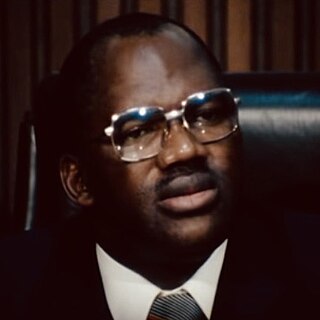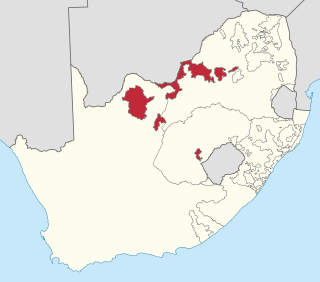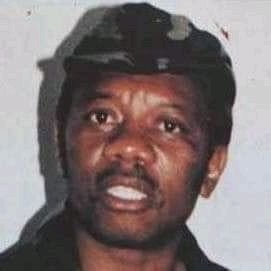Related Research Articles

Bhisho, formerly Bisho, is the capital of the Eastern Cape province in South Africa. The Office of the Premier, Provincial Legislature and many other government departments are headquartered in the town. The town, three kilometres from Qonce and 70 kilometres from East London, is also part of Buffalo City.

Ciskei, officially the Republic of Ciskei, was a Bantustan for the Xhosa people, located in the southeast of South Africa. It covered an area of 7,700 square kilometres (3,000 sq mi), almost entirely surrounded by what was then the Cape Province, and possessed a small coastline along the shore of the Indian Ocean.

An askari or ascari was a local soldier serving in the armies of the European colonial powers in Africa, particularly in the African Great Lakes, Northeast Africa and Central Africa. The word is used in this sense in English, as well as in German, Italian, Urdu, and Portuguese. In French, the word is used only in reference to native troops outside the French colonial empire. The designation is still in occasional use today to informally describe police, gendarmerie and security guards.

Lennox Leslie Wongama Ngweyesizwe Sebe was the chief minister of the Xhosa bantustan of Ciskei after its self-rule in 1972, and the nominally independent country's first president from 1983. He was the Chief of the AmaKhambashe Tribal Authority and his praise name (isikhahlelo) was Ngweyesizwe.
Joshua Oupa Gqozo was the military ruler of the former homeland of Ciskei in South Africa.

The Azanian People's Liberation Army (APLA), formerly known as Poqo, was the military wing of the Pan Africanist Congress, an African nationalist movement in South Africa. In the Xhosa language, the word 'Poqo' means 'pure'.

The 1994 Bophuthatswana crisis was a major political crisis which began after Lucas Mangope, the president of Bophuthatswana, a nominally independent South African bantustan created under apartheid, attempted to crush widespread labour unrest and popular demonstrations demanding the incorporation of the territory into South Africa pending non-racial elections later that year. Violent protests immediately broke out following President Mangope's announcement on 7 March that Bophuthatswana would boycott the South African general elections. This was escalated by the arrival of right-wing Afrikaner militias seeking to preserve the Mangope government. The predominantly black Bophuthatswana Defence Force and police refused to cooperate with the white extremists and mutinied, then forced the Afrikaner militias to leave Bophuthatswana. The South African military entered Bophuthatswana and restored order on 12 March.

The Bisho massacre occurred on 7 September 1992 in Bisho, in the then nominally independent homeland of Ciskei which is now part of the Eastern Cape in South Africa. Twenty-eight African National Congress supporters and one soldier were shot dead by the Ciskei Defence Force during a protest march when they attempted to enter Bisho to demand the reincorporation of Ciskei into South Africa during the final years of apartheid.

The South African Civil Cooperation Bureau (CCB) was a government-sponsored death squad, during the apartheid era. The CCB, operated under the authority of Defence Minister General Magnus Malan. The Truth and Reconciliation Committee pronounced the CCB guilty of numerous killings, and suspected more killings.
The Gugulethu Seven was an anti-apartheid group of men between the ages of 16 and 23 who were shot and killed on 3 March 1986 by members of the South African Police force. The seven men included Mandla Simon Mxinwa, Zanisile Zenith Mjobo, Zola Alfred Swelani, Godfrey Jabulani Miya, Christopher Piet, Themba Mlifi and Zabonke John Konile. It was later uncovered that the police operation that unearthed the Gugulethu Seven's plans had been in the works for some time.
Looksmart Khulile Ngudle was a South African politician. He was a member of the African National Congress (ANC) and South African Communist Party (SACP), an Umkhonto we Sizwe (MK) Commander and South African Congress of Trade Unions (SACTU) leader in the Western Cape. Ngudle's death is controversial, as he was the first person to die in detention during South Africa's Apartheid Era.

111 Battalion was a motorised infantry unit of the South African Army.

116 Battalion was a motorised infantry unit of the South African Army.

151 South African Infantry Battalion was a motorised infantry unit of the South African Army.

111 Battalion was a motorised infantry unit of the South African Army.

115 South African Infantry Battalion was a motorised infantry unit of the South African Army.

118 South African Infantry Battalion was a motorised infantry unit of the South African Army.

Sabelo Phama [born Sabelo Gqwetha] was a political Activist, Military Commander of Azanian People's Liberation Army APLA and Secretary for Defense of the Pan African Congress PAC.

The 1990 Ciskei coup d'état was a bloodless military coup in Ciskei, an unrecognised state and a nominally independent South African homeland for the Xhosa people, which took place on 4 March 1990. The coup was led by the then 37-year-old Brigadier Oupa Gqozo, the Chief of Staff Intelligence of the Ciskei Defence Force, against the government of President for Life Lennox Sebe (CNIP), who was on a state visit to Hong Kong at the time. The coup was followed by widespread rioting and looting, prompting Gqozo to request that the South African government send SADF troops to help restore order.
The Ciskei National Independence Party (CNIP) was a political party in the nominally independent South African homeland of Ciskei. It was founded and led by Lennox Sebe. The party advocated cooperation with the South African government. The party governed Ciskei from 1973 until the 1990 coup d'état by Oupa Gqozo.
References
- ↑ "Lt. Gen. Charles Xhanti Sebe: A few Famous Quotes". www.museum.za.net.
- ↑ "Truth Commission - Special Report - TRC Final Report - Volume 2, Section 1, Chapter". sabctrc.saha.org.za.
- ↑ Lelyveld, Joseph (25 September 1983). "MISERY IN A SOUTH AFRICAN 'HOMELAND'". The New York Times.
- ↑ "South Africa: Ciskei: Ten Years on Human Rights and the Fiction of "Independence" (Human Rights Watch Report, December 20, 1991)". www.hrw.org.
- ↑ "Truth Commission - Special Report - TRC Final Report - Volume 2, Section 1, Chapter". sabctrc.saha.org.za.
- ↑ sahoboss (16 March 2011). "Former commander of the armed forces of the Ciskei, Major-General Charles Sebe is imprisoned".
- ↑ "Application in terms of section 18 of the promotion of National Unity and Reconciliation Act, no. 34 of 1995 - Kwanele Enough Thoba applicant". Archived from the original on 19 August 2018.
- ↑ Times, Alan Cowell and Special To the New York (20 October 1986). "PRETORIA PUZZLE: 'HOMELANDS' AT ODDS". The New York Times.
- ↑ "SAPA - 29 Jul 96 - FORMER CISKEI RULER'S SON WAS MOST FEARED IN". www.justice.gov.za.
- 1 2 "Truth Commission - Special Report - TRC Final Report - Volume 3, Section 1, Chapter". sabctrc.saha.org.za.
- 1 2 "Pretoria's 'Divide and Rule' Strategy in Ciskei". Christian Science Monitor. 9 September 1992.
- ↑ "The rule of brigadier Oupa Gqozo in Ciskei" (PDF). Archived from the original (PDF) on 19 August 2018.
- ↑ "South Africa: Second alleged Ciskei coup plotter killed".
- ↑ "Today In History - YFM - Yona Ke Yona". yworld.co.za. Archived from the original on 19 August 2018. Retrieved 19 August 2018.